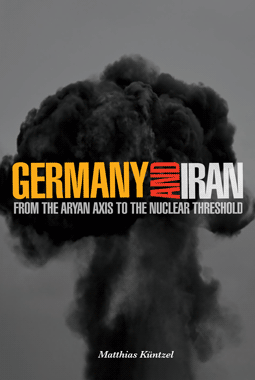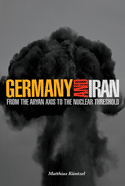By Matthias Küntzel · Friday, May 24, 2019 Matthias Küntzel’s Germany and Iran: From the Aryan Axis to the Nuclear Threshold, published by Telos Press Publishing, presents an extensive and detailed historical account of German–Iranian relations from the early twentieth century to the present. Save 20% on your purchase of Küntzel’s Germany and Iran in our online store by using the coupon code BOOKS20 during checkout. The following essay has been translated from the German by Matthew J. Cooper.
As late as May 7, 2019, France sent a message to Iran’s rulers: “We do not want Tehran to announce tomorrow actions that would violate the nuclear agreement, because in this case we Europeans would be obliged to reimpose sanctions as per the terms of the agreement.”
 The admonition was futile. On the following day, exactly one year since the United States withdrew from the nuclear agreement, Iran’s President Hassan Rouhani made two things public: He announced that effective immediately the regime no longer felt bound by the central provisions of the nuclear agreement. For example, by section 7, which requires the regime to limit its inventory of low-enriched uranium to 300 kg. Also affected is section 10, according to which Iran may not manufacture or store more than 130 tons of heavy water for fifteen years. Iran will not adhere to this provision either, according to Rouhani. Heavy water is used for reactors that are specially adapted for the production of weapons-grade plutonium. These quantitative restrictions on materials needed for nuclear weapons belong to the core of the agreement that Tehran is now avowedly violating. The admonition was futile. On the following day, exactly one year since the United States withdrew from the nuclear agreement, Iran’s President Hassan Rouhani made two things public: He announced that effective immediately the regime no longer felt bound by the central provisions of the nuclear agreement. For example, by section 7, which requires the regime to limit its inventory of low-enriched uranium to 300 kg. Also affected is section 10, according to which Iran may not manufacture or store more than 130 tons of heavy water for fifteen years. Iran will not adhere to this provision either, according to Rouhani. Heavy water is used for reactors that are specially adapted for the production of weapons-grade plutonium. These quantitative restrictions on materials needed for nuclear weapons belong to the core of the agreement that Tehran is now avowedly violating.
Continue reading →
By Telos Press · Wednesday, May 22, 2019 Writing at the American Interest, Matthias Küntzel analyzes the divide between the United States and Germany regarding Donald Trump’s decision last year to withdraw the U.S. from the nuclear deal with Iran. In his book Germany and Iran: From the Aryan Axis to the Nuclear Threshold, published by Telos Press Publishing, Küntzel presents an extensive and detailed historical account of German-Iranian relations from the early twentieth century to the present, which provides essential context for understanding this split. Save 20% on your purchase of Küntzel’s Germany and Iran in our online store by using the coupon code BOOKS20 during checkout.
An excerpt from Küntzel’s recent essay:
 Trump’s decision is not without risk. Given the nature of the Iranian regime, irrational responses and war scenarios can’t be ruled out. Exactly one year after the United States left the deal, Iranian President Hassan Rouhani announced a partial withdrawal, saying Iran would keep excess enriched uranium and heavy water instead of selling it. Continuing the policy of nuclear blackmail, he threatens to resume higher uranium enrichment after 60 days. However, at least for the time being, Tehran seems not to be interested in a massive escalation. Trump’s decision is not without risk. Given the nature of the Iranian regime, irrational responses and war scenarios can’t be ruled out. Exactly one year after the United States left the deal, Iranian President Hassan Rouhani announced a partial withdrawal, saying Iran would keep excess enriched uranium and heavy water instead of selling it. Continuing the policy of nuclear blackmail, he threatens to resume higher uranium enrichment after 60 days. However, at least for the time being, Tehran seems not to be interested in a massive escalation.
Trump’s alternative approach—to put sufficient economic and political pressure on the Iranian leadership to compel it to sign a new agreement that would address not only Iran’s nuclear ambitions but also its missile program and regional warmongering—may be a long shot, but it is worth trying. Effective sanctions, however, require the cooperation of Iran’s most important trade partners, Germany and the European Union. And that is where the problem starts.
Continue reading →
By Fabrice Balanche · Friday, September 14, 2018 With the re-establishment of Bashar al-Assad’s power in Syria, the strengthening of Hezbollah in Lebanon, and finally the political and military victory of pro-Iranian forces in Iraq, it is clear that an Iranian axis now prevails in the Levant. The strength of this geopolitical axis is reinforced by the territorial continuity between Tehran and Beirut via Damascus and Baghdad: “the Iranian land bridge” or “Iranian corridor,” controlled by Iranian troops directly and by proxies. Since the Shia militias joined the Syrian-Iraqi border in May 2017, the Iranian land bridge has continued to expand, despite the U.S. troop presence on both sides, in the al-Tanef pocket and in northeastern Syria. Until spring 2017, the West seemed incredulous about this reality. However, at that time, it was already too late to block the Shiite militias in eastern Syria, and the Iranian land bridge became a reality.
Continue reading →
By Telos Press · Friday, August 31, 2018 In a new opinion piece in the Jerusalem Post, Sean Durns discusses Matthias Küntzel’s Germany and Iran: From the Aryan Axis to the Nuclear Threshold, published by Telos Press. Pick up your copy of Germany and Iran in our online store, and save 20% with the coupon code BOOKS20.
 As the German historian Matthias Küntzel detailed in his 2014 book, Germany and Iran: From the Aryan Axis to the Nuclear Threshold, close ties between the two countries go back to the pre-World War I era. As the German historian Matthias Küntzel detailed in his 2014 book, Germany and Iran: From the Aryan Axis to the Nuclear Threshold, close ties between the two countries go back to the pre-World War I era.
In the late 19th century, Persian hopes for industrial development hinged on German know-how and technological prowess. After the ascension of Kaiser Wilhelm II in 1888, “economic relations between the two countries began to expand swiftly” and “it became fashionable for young Persian intellectuals to be pro-German,” Küntzel notes.
Continue reading →
By Jeffrey Herf · Tuesday, May 29, 2018 Can the same Trump who lies constantly, flouts the norms of the rule of law, fans the flames of racial resentment, and attacks basic notions of fact and evidence offered by journalists and his own law enforcement and intelligence agencies, can this same man be right about leaving the Joint Comprehensive Plan of Action (JCPOA) Iran nuclear deal of 2015? This instance of cognitive dissonance, of holding two or more contradictory beliefs in our minds at the same time, is staring us in the face. The serial liar, that man who has undermined our alliances and replaces rational explanations with conspiracy theories, has made the right decision to leave the JCPOA and to restore and intensify the economic sanctions on Iran in an effort to bring about a definitive end to both its nuclear program and its regional imperialism in the Middle East. In the polarized climate he has done so much to create, Trump supporters forget Trump the liar while agreeing on policy while those of us who oppose him reject any policy he advocates. The desire for consistency generally overwhelms the discomfort of cognitive dissonance. In the following, I make the case for living with the discomfort of accepting that this awful man who is wrong about most everything is right about this issue.
Continue reading →
By Matthias Küntzel · Wednesday, May 16, 2018 Matthias Küntzel’s book Germany and Iran: From the Aryan Axis to the Nuclear Threshold is available for purchase in our online store. Save 20% on the list price by using the coupon code BOOKS20 during checkout. Also available in Kindle format from Amazon.com.
On May 8, 2018, when U.S. President Donald Trump spoke to the press to make the case for the U.S. decision to leave the nuclear deal with Iran, he stated: “America will not be held hostage to nuclear blackmail.” With this sentence, Trump initiated a new phase to diplomacy with Iran. Up to this point, nuclear blackmail, the threat that Iran would otherwise build a bomb, had defined and shaped the dynamic of negotiations. This worst case hung like a sword of Damocles over the actors. In order to avert it and in order to secure the nuclear deal, Obama refused to support the Iranian protest movement in 2009, just as in 2013 he refused to make good on the red line he had drawn in the Syrian war.
Continue reading →
|
|
 The admonition was futile. On the following day, exactly one year since the United States withdrew from the nuclear agreement, Iran’s President Hassan Rouhani made two things public: He announced that effective immediately the regime no longer felt bound by the central provisions of the nuclear agreement. For example, by section 7, which requires the regime to limit its inventory of low-enriched uranium to 300 kg. Also affected is section 10, according to which Iran may not manufacture or store more than 130 tons of heavy water for fifteen years. Iran will not adhere to this provision either, according to Rouhani. Heavy water is used for reactors that are specially adapted for the production of weapons-grade plutonium. These quantitative restrictions on materials needed for nuclear weapons belong to the core of the agreement that Tehran is now avowedly violating.
The admonition was futile. On the following day, exactly one year since the United States withdrew from the nuclear agreement, Iran’s President Hassan Rouhani made two things public: He announced that effective immediately the regime no longer felt bound by the central provisions of the nuclear agreement. For example, by section 7, which requires the regime to limit its inventory of low-enriched uranium to 300 kg. Also affected is section 10, according to which Iran may not manufacture or store more than 130 tons of heavy water for fifteen years. Iran will not adhere to this provision either, according to Rouhani. Heavy water is used for reactors that are specially adapted for the production of weapons-grade plutonium. These quantitative restrictions on materials needed for nuclear weapons belong to the core of the agreement that Tehran is now avowedly violating. 







